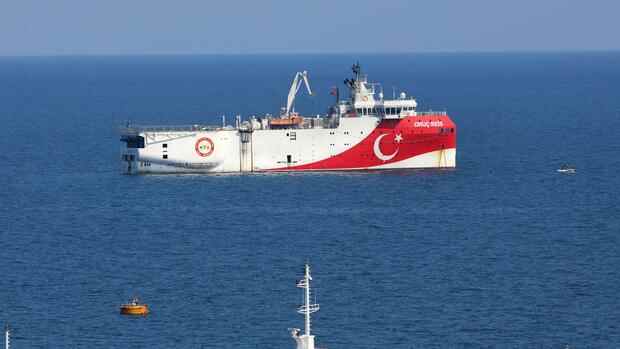The operations of Turkish exploration ships in the Mediterranean cause displeasure.
(Photo: dpa)
Istanbul In the wake of rising oil and gas prices, tensions in the eastern Mediterranean are mounting again. The administration in the Turkish capital Ankara warned Cyprus on Thursday evening that it would drill in a region that Turkey regards as its own continental shelf.
Cyprus, in turn, regards the area as its own exclusive economic zone. “Such steps increase tensions,” said a spokesman for the Turkish Foreign Ministry.
Tensions, which the neighbors apparently accept again after a phase of diplomatic efforts. Because the rising gas prices make the region even more attractive.
Huge gas reserves are suspected to be under the eastern Mediterranean. It is estimated that around 3.5 trillion cubic meters of natural gas and 1.7 billion barrels of oil are stored there. In Germany that would be enough for almost 40 years.
Top jobs of the day
Find the best jobs now and
be notified by email.
But this also increases the efforts of the participating states to claim as much as possible of these deposits and thus of the region for themselves. If necessary, also with military pressure.
Impending dependence on Russia is a decisive factor
It was different in the pandemic year 2020, when oil and gas prices had slumped by more than 40 percent. After intense tensions over territorial claims in the Mediterranean, Turkey and the EU agreed in winter to resolve the conflict diplomatically.
But now the gas price has risen rapidly, especially in the European Union. Natural gas there now costs four times more than at the beginning of the year. The looming dependency on Russia and the new Nord Stream 2 pipeline arouses even more desire to look for gas elsewhere.
The tension has already started. The planned “EastMed” pipeline, which would never have been profitable at the cheap gas prices of last year, suddenly appears in a different light. Egypt, Greece, Israel, Italy, Jordan, Palestine and Cyprus have resumed their plans to jointly transport gas from the Mediterranean to Europe.
Turkey is excluded from the “EastMed” pipeline. That is why the country is looking for gas in the region on its own account. The Turkish state-owned oil company Türk Petrolleri announced on Thursday that it would drill in six areas in the eastern Mediterranean.
Drill ships are escorted by the military
Cyprus is also keen to develop its own offshore resources. By 2019, the country signed contracts with the oil multinationals ExxonMobil, Eni and Total. But the project stalled, not least because of the pandemic.
High energy prices across Europe and around the world could offer the country a new opportunity: The US company ExxonMobil will soon be looking for gas in the region on behalf of the government in Nicosia. According to a statement from the Cypriot government, the company will begin test drilling in the so-called Block 10, southwest of Cyprus, at the end of the year.
The company doesn’t come alone. The US Navy has sent one of its largest aircraft carriers to the region – officially to hold military exercises. The Americans’ strategic calculation: The “EastMed” project brings together seven Mediterranean countries who are otherwise not necessarily green. That would stabilize the balance of power in the region. It also reduces Europe’s reliance on gas from Russia, which the Americans should also like.
Turkey does not want to put up with that. The presence of foreign military personnel would not change the balance of power in the region, said Turkish Defense Minister Hulusi Akar recently. His country seems anxious to let the dispute over natural gas escalate if necessary.
More: The German guilt for the Russian gas price dictate.
